

Designing Organizations for an Information Rich World - Herbert Simon's Speech. A Brief History of the Corporation: 1600 to 2100. On 8 June, a Scottish banker named Alexander Fordyce shorted the collapsing Company’s shares in the London markets.
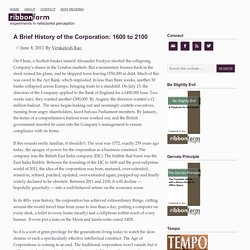
But a momentary bounce-back in the stock ruined his plans, and he skipped town leaving £550,000 in debt. Much of this was owed to the Ayr Bank, which imploded. In less than three weeks, another 30 banks collapsed across Europe, bringing trade to a standstill. On July 15, the directors of the Company applied to the Bank of England for a £400,000 loan. Two weeks later, they wanted another £300,000. If this sounds eerily familiar, it shouldn’t. In its 400+ year history, the corporation has achieved extraordinary things, cutting around-the-world travel time from years to less than a day, putting a computer on every desk, a toilet in every home (nearly) and a cellphone within reach of every human.
So it is a sort of grim privilege for the generations living today to watch the slow demise of such a spectacularly effective intellectual construct. Arthur C. Reach versus Power II. The Attention Economy: Understanding the New Currency of Business - Professor Thomas H Davenport, John C. Beck. The Economics of Attention: Style and Substance in the Age of Information by Richard A. Lanham, an excerpt. Discussion: The Economics of Attention. How (Not) to Study the Attention Economy. Richard A.
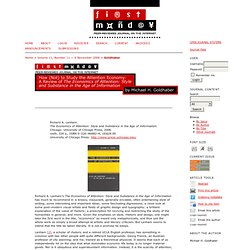
Lanham’s The Economics of Attention: Style and Substance in the Age of Information has much to recommend it: a breezy, insouciant, generally enviable, often entertaining style of writing; some interesting and important ideas; some fascinating digressions; a close look at some post–modern visual artists and fields of graphic design and typography; a brilliant explanation of the value of rhetoric; a prescription for reviving and redirecting the study of the humanities in general; and more. Given the emphasis on style, rhetoric and design, one might take the first word in the title, “economics” as meant only metaphorically, and thus see the whole work as simply a broad attempt at artistic and literary criticism. But Lanham seems to intend that the title be taken literally. It is not a promise he keeps. “OK. So there you have the three ages of economy redefined: agriculture, industrialism, fluff. “But when you interpret nature as information, stuff and fluff change places.”
The Attention Economy and the Net. Attention Economy: The Game. In my course Friend Request Denied: Social Networks and the Web I have my students play a game I developed to let them explore the dynamics of building a reputation online by giving and capturing attention.
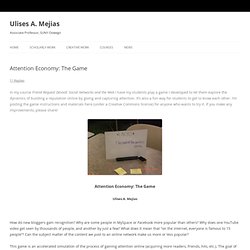
It’s also a fun way for students to get to know each other. I’m posting the game instructions and materials here (under a Creative Commons license) for anyone who wants to try it. If you make any improvements, please share! Attention Economy: The Game Ulises A. How do new bloggers gain recognition? Advertising in the Cyberspace Era. Attention, Meaning, and Meaningfulness. The Attention Economy and the Net, V2. If the Web and the Net can be viewed as spaces in which we will increasingly live our lives, the economic laws we will live under have to be natural to this new space.
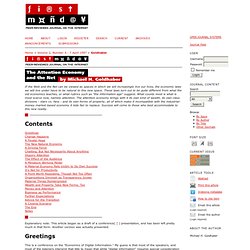
These laws turn out to be quite different from what the old economics teaches, or what rubrics such as "the information age" suggest. What counts most is what is most scarce now, namely attention. The attention economy brings with it its own kind of wealth, its own class divisions - stars vs. fans - and its own forms of property, all of which make it incompatible with the industrial-money-market based economy it bids fair to replace.
Success will come to those who best accommodate to this new reality. Explanatory note: This article began as a draft of a conference[ * ] presentation, and has been left pretty much in that form. Attention Trust. The Attention Trust = set of principles to govern the Attention Economy based on the self-ownership of the data we create, and specialized software to regulate their use.
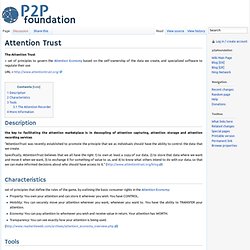
URL = AttentionTrust.org: a Declaration of Gestural Independence. Last Friday, I led a workshop to build a web site for a new foundation that Steve Gillmor and Hank Barry and I have been thinking through called AttentionTrust.
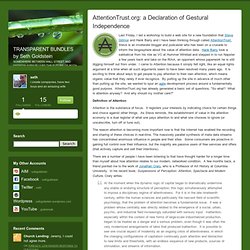
Steve is an inveterate blogger and podcaster who has been on a crusade to inform the blogosphere about the value of attention data. Hank Barry took a sabbatical from his role as VC at Hummer Winblad and stepped in to run Napster a few years back and take on the RIAA, an opponent whose paperwork he is still digging himself out from under. I came to Attention because it simply felt right, like an equal rights argument at a time when all such arguments seem to have been resolved many years ago. Return on Attention and Infomediaries. Attention is getting a lot of attention.
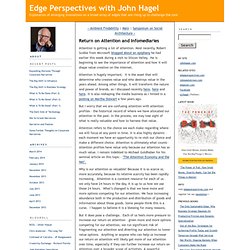
Most recently, Robert Scoble from Microsoft blogged about an epiphany he had earlier this week during a visit to Silicon Valley. He is beginning to see the importance of attention and how it will shape value creation on the Internet. Understanding Attention Scarcity – Why The Attention Economy Belongs to Peers, Not Brands. The invisible hand of time: How attention scarcity creates innovation opportunity. Thinking in terms of time and attention will quickly start to change the way you think about products and services, customer behavior, even business models.
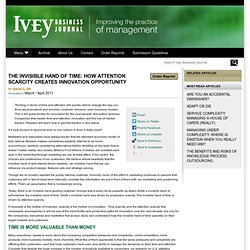
This is the great frontier for innovation for the next decade, this author believes. Companies that master time and attention innovation will find lots of market traction. Readers will learn how to get that traction in this article. If a new product is launched and no one notices it, does it really exist? Marketers and executives have always known that the standard economic model of fully rational decision makers (sometimes playfully referred to as homo economicus), carefully considering alternatives before deciding on the best choice, doesn’t match reality very closely. Attention Economy: All You Need To Know. The Attention Economy is a marketplace where consumers agree to receive services in exchange for their attention.
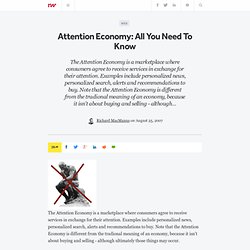
Examples include personalized news, personalized search, alerts and recommendations to buy. Note that the Attention Economy is different from the tradional meaning of an economy, because it isn't about buying and selling - although ultimately those things may occur. News feeds illustrate the point well, since they ask for consumers attention in exchange for the opportunity to show them advertising. Search engines also show ads (asking for consumers attention) in exchange for helping users find answers online (a service provided for free in exchange for that attention). The Attention Economy: An Overview. Written by Alex Iskold and edited by Richard MacManus It is no secret that we live in an information overload age.
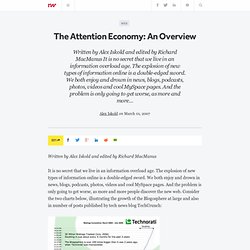
The explosion of new types of information online is a double-edged sword. We both enjoy and drown in news, blogs, podcasts, photos, videos and cool MySpace pages. The Implicit Web: Last.fm, Amazon, Google, Attention Trust. As we rush through life and a myriad of web pages, we leave traces. We don't have time to think deeply about any of this. The blogs that we visit, the music we listen to, the movies we watch; we take all of them for granted. Yet, all of the different kinds of information that we interact with defines us.
In turn, we change the world by issuing a verdict of what we like and what we do not like. Sometimes explicitly via bookmarking, rating and digging. Continuous Partial Attention: Software & Solutions. The ways in which we consume and pay attention to information are changing. The changes are not minor, they are big and profound. Towards the Attention Economy: Will Attention Silos Ever Open Up? We have written extensively at Read/WriteWeb about Attention and the Attention Economy. As a concept attention makes sense to anyone who is online today. We know when we are paying attention and we know what we are paying attention to. The problem is that the information about our attention is not readily available to us afterwards. The premise of the Attention Economy is that people are in control of their attention information.
This control lets them use the information to receive utility and services. Paying attention to the attention economy. Most of us are happily obsessed with the economy of money. We earn it and we spend it and we generally pay attention to what things cost. Certainly, salespeople and marketers are truly focused on the price of things, on commissions and shelving allowances and net margin and the cost of goods sold.
With all of these easily measured activity, it's easy to overlook the fast-growing and ever more important economy based around attention. "If I alert my entire customer base, how much will this cost me in permission? " "How much time do we save our customers with a better written manual? " "When we fail to ask for (and reward) the privilege of following up, are we wasting permission? " "Does launching this product to an audience of strangers waste the attention we're going to have to buy? " Attention is a bit like real estate, in that they're not making any more of it.
The Attention Economy. Forget money; recognition is the new motive force. We’re happy to be paid in attention, social recognition. Attention is currency — advertisers make it so — and thus garnering personal attention starts to feel more significant, for its own sake. Hence reality-TV narcissism and public journaling and rampant exhibitionism in our culture. The Human Feed: How Humans Filter Signal From Noise. There's a lot of talk about Twitter these days from upcoming books such as Shel Israel's Twitterville to how-to's like Twitter For Dummies. But there's a much bigger movement at play here that you need to grasp before you go diving into networks such as Twitter and try friending your way toward influencer status. I believe that one of the functions that networks such as Twitter does is to serve as something of a human powered feed, a real time living stream of links, content and conversation often times generated by our friends, peers or the people we look to as "filters"—indivisuals who we trust to seperate the wheat from chaff.
But aside from the tools, it's important to take a step back and see what's going on here. The False Question Of Attention Economics. Shirky: Problem is filter failure, not info overload. I didn't attend the Web 2.0 Expo in New York last year, and so the exceptional keynote speech of Clay Shirky, a New York University new-media professor, writer, and consultant on the social and economic effects of Internet technologies. The keynote, "It's not information overload. It's filter failure," is an insightful exploration of Internet economics and an intelligent response to Nick Carr's " Is Google Making Us Stupid? " argument. If you haven't watched it, you must. It does more to explain the dearth of effective information filters that we wade through today.
You can watch it here: But here is where he lays out the crux of the problem, which I've transcribed: Declaring bankruptcy in the attention economy. Just when you think there couldn’t possibly be any more information coming at you on the social web (and I am using the term “information” very loosely), another source pops up. Culture of Fear + Attention Economy = ?!?! Signal P&G Attention Economy. A Short Manifesto on the Future of Attention. In 1971, the oft-quoted political scientist Herbert Simon predicted that in an information age, cultural producers (that's designers, but also filmmakers, theater types, musicians, artists) would quickly face a shortage of attention. The Attention Economy. Today’s idea: With attention in short supply, we should start paying more for things that don’t waste our time, a writer suggests. Ten strategies for survival in the attention economy.
Attention, Media, Value and Economics. Read related articles on Internet economics Building on the debate about the "attention economy" initiated by Michael Goldhaber and Rishab Aiyer Ghosh, I introduce the notion of valuing process, i.e. the process by which potential value can be translated in an economy. Speculative microeconomics for tomorrow's economy. Economics is dead. Long live economics! A Commentary on Michael Goldhaber's The Attention Economy. What's the Right Economics for Cyberspace? In April's First Monday , I argued that the growth of cyberspace heralds a new kind of economy, and with it , a new kind of economics, both based on the characteristics not of material, mass-produced goods, nor of money, nor of information, but of attention. Attention Shoppers! Goldhaber on the Attention Economy. The Attention Economy will change Everything. The value of openness in an attention economy.
Art and the Attention Economy in Real Space and Cyberspace. The Dream Life of Money. Attention Economics and the Productivity Paradox. Sex and Power in the Attention Economy. Attention Economy and the Net - Part II. Blogging at Work and the Corporate Attention Economy. Income Inequality in the Attention Economy. A persistence paradox. Paying Attention - Multiple Articles. Paying Attention - A conference concerning the Attention Economy. The Economy of Attention. The Cinematic Mode of Production: Attention Economy And the Society of the ... - Jonathan Beller.
The Attention Economy.